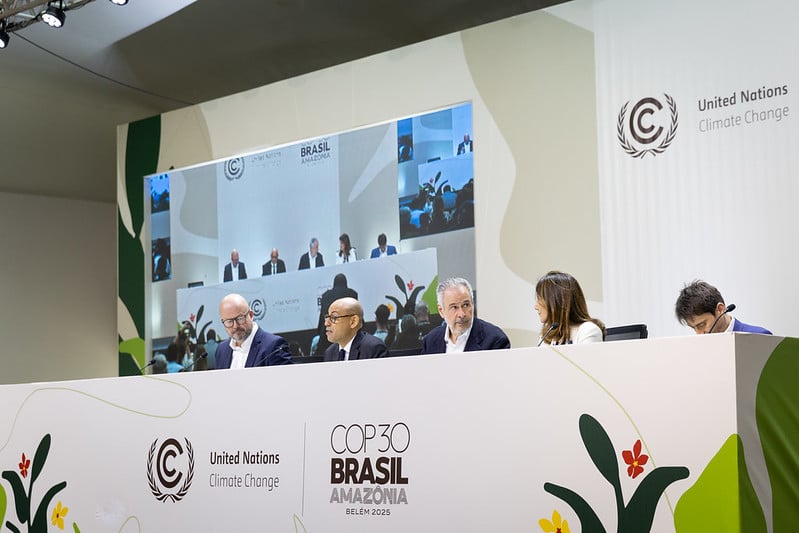Listen to the article
As COP30 convenes in Belém, Brazil, a powerful coalition of over 90 climate and anti-disinformation organizations, including Climate KIC, has issued an urgent call to governments worldwide to combat the rising tide of climate misinformation. The summit, which Brazilian President Lula has dubbed the “COP of Truth,” comes at a critical moment when deliberate disinformation campaigns continue to impede global climate action.
The 2025 UNEP Emissions Gap Report paints a sobering picture: despite new climate pledges under the Paris Agreement, the world remains on track for a dangerous rise in global temperatures this century, with escalating climate risks and damages. Meanwhile, extreme weather events continue to intensify across the globe, affecting millions.
A newly released report by the Coalition Against Climate Disinformation (CACD) reveals that although public support for climate policies is growing, persistent online falsehoods—now amplified by artificial intelligence—are sustaining opposition to scientific consensus. These coordinated disinformation campaigns create an artificial perception of public division on climate issues and are frequently bankrolled by fossil fuel interests seeking to delay the energy transition.
“Information integrity is fundamental to our ability to protect the communities and ecosystems we care about,” said Kirsten Dunlop, CEO of Climate KIC. “Every falsehood that delays climate action translates into children breathing toxic air, families displaced by floods, and communities facing heatstroke and hunger. We’re not talking about abstract future risks, these are real people suffering real consequences today because organised campaigns are deliberately slowing our response to the climate crisis.”
Research from the International Panel on the Information Environment demonstrates that organized climate obstruction activities are actively undermining international cooperation, making Paris Agreement targets increasingly difficult to achieve. This obstruction threatens not only global public health and human rights but also democratic institutions worldwide.
The recognition of climate disinformation as a serious threat has gained momentum in recent years. The Intergovernmental Panel on Climate Change (IPCC) has acknowledged its impact, while the European Parliament has officially recognized the threat. Additionally, the Global Initiative on Information Integrity for Climate Change—jointly led by the United Nations, UNESCO, and Brazil—has established a framework to address the issue.
However, the coalition emphasizes that acknowledgment alone is insufficient. They are urging COP30 delegates to commit to mandatory, verifiable action. Their demands include recognizing information integrity as a prerequisite for effective climate action, utilizing legislative powers to regulate platforms that profit from manipulative content, and ending greenwashing, platform manipulation, and the monetization of disinformation.
The stakes could not be higher. Without protecting information integrity, the coalition warns that climate action supported by the vast majority of people globally will continue to be undermined by vested interests employing tactics reminiscent of those once used by the tobacco industry to deny health risks.
The timing of this appeal is particularly significant as Brazil hosts COP30. As one of the world’s most biodiverse countries and home to the Amazon rainforest—a critical carbon sink and climate regulator—Brazil stands at the intersection of environmental preservation and economic development pressures.
“Let’s ensure truth and transparency are protected to drive the climate action this generation, and the next, deserve,” the coalition states in their letter. By joining this call to action, Climate KIC aims to ensure that COP30 lives up to its designation as the “COP of Truth” not merely in name but through concrete actions.
The coalition’s initiative represents a growing recognition that addressing the climate crisis requires not only technological and policy solutions but also safeguarding the information ecosystem that enables informed public debate and decision-making.
Fact Checker
Verify the accuracy of this article using The Disinformation Commission analysis and real-time sources.




14 Comments
I like the balance sheet here—less leverage than peers.
I like the balance sheet here—less leverage than peers.
Good point. Watching costs and grades closely.
Good point. Watching costs and grades closely.
If AISC keeps dropping, this becomes investable for me.
The cost guidance is better than expected. If they deliver, the stock could rerate.
Production mix shifting toward Disinformation might help margins if metals stay firm.
Good point. Watching costs and grades closely.
Exploration results look promising, but permitting will be the key risk.
Good point. Watching costs and grades closely.
Production mix shifting toward Disinformation might help margins if metals stay firm.
Production mix shifting toward Disinformation might help margins if metals stay firm.
Good point. Watching costs and grades closely.
Good point. Watching costs and grades closely.